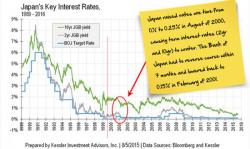Bank Of Japan Said To Start Preparing For Losses On Its "Huge" Debt Holdings Once QE Ends
While it most likely is just the usual Friday (past) midnight trial balloon by the Nikkei, a media outlet that has promptly become the BOJ's mouthpiece (recall a week ago the new owner of the FT reported that Abe would delay his 2017 sales tax increase, only to see the premier backpedal when the reaction in the USDJPY was not quite as desired), moments ago the Japanese publication reported that the Bank of Japan will "likely set aside funds for the first time to prepare for losses on its huge holdings of Japanese government bonds should the central bank end its monetary easing polic

